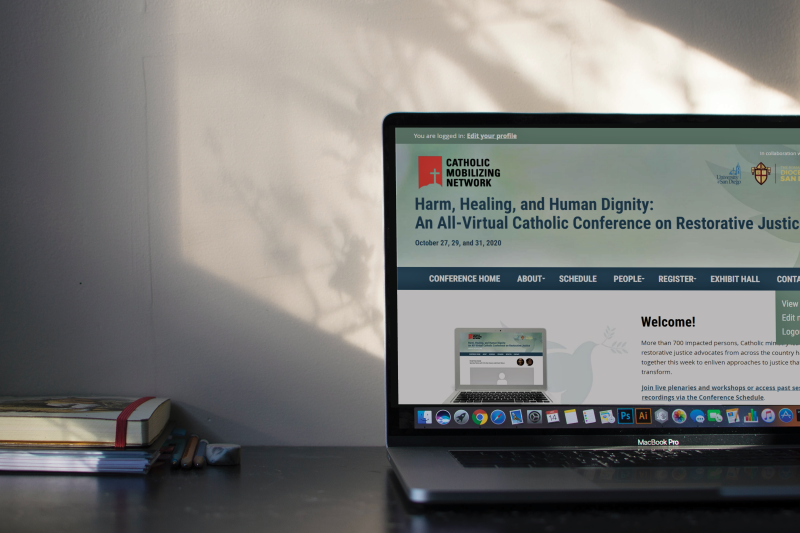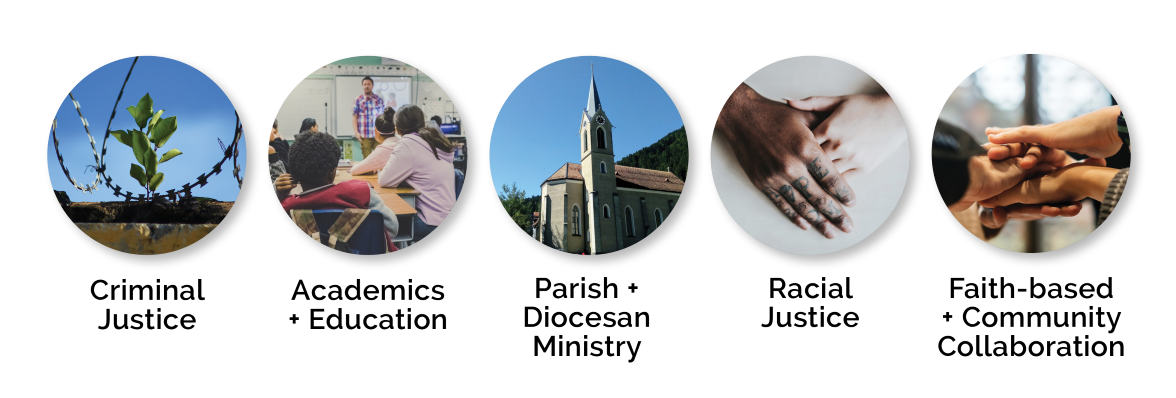The Historic Convening
On October 27, 29, and 31, more than 700 impacted persons, restorative justice advocates, and Catholic ministry leaders from across the country gathered online for an all-virtual Catholic conference on restorative justice presented by Catholic Mobilizing Network. Four countries and 42 states — including Washington, DC — were represented in this historic convening organized in collaboration with the University of San Diego Center for Restorative Justice and the Catholic Diocese of San Diego.
Over the course of three days, conference participants learned, networked, and explored vital ways of enlivening Catholic engagement with restorative justice in the United States.

Our Guiding Questions
A lived expression of Catholic Social Teaching principles, restorative justice is a way of responding to harm in terms of the people and relationships impacted, rather than exclusively a law or rule that was broken. Restorative practices — like peacemaking circles and community conferencing — seek to repair harm through transformative encounters that model Jesus’ reconciling way.
Given the many, rich intersections between the practices of restorative justice and the teachings of our faith, at the conference’s outset, CMN presented attendees with a pair of “guiding questions” to frame their engagement with the event:
1. How can restorative justice invite us to embrace healing approaches to harm and injustice?
2. What are the unique gifts that Catholic tradition and ministry lend to restorative justice practices in the U.S.?
The questions invited participants to immerse themselves deeply in the personal stories and practical learnings presented over the conference’s three days, and to consider opportunities for the implementation of restorative practices across their respective areas of Catholic ministry.
Our Focal Areas
The conference offered dozens of dynamic workshops, plenaries, and side events designed to highlight local and national applications of restorative justice. Conference sessions fostered opportunities for formation, story-sharing, and network-building among Catholic individuals and institutions, and spanned an array of focal areas, including criminal justice; academics and education; parish and diocesan ministry; racial justice; and faith-based and community collaboration.

Going Virtual
First conceptualized as an in-person conference to take place at the University of San Diego in July 2020, the Harm, Healing, and Human Dignity Conference transitioned to an online format as a result of the ongoing COVID-19 pandemic.
It quickly became clear that a virtual delivery would vastly widen the conference’s reach and accessibility.
Ultimately, this yielded an expanded audience and an astounding speaker lineup, including those shown here.
Coalescing a Movement
Catholic interest in restorative justice is consistently growing, and transformative responses to harm and injustice are needed more than ever. The Harm, Healing, and Human Dignity Conference set a crucial context for that widening engagement, and fostered key connections between those advancing restorative practices in the U.S. Church and expert practitioners in the larger restorative justice arena.
From conference participants and planners alike, there was a shared recognition of the Holy Spirit’s movement within this virtual space, lifting and inspiring our moral imaginations to envision another way of doing justice.
Restorative justice gives us tools for living in right-relationship with one another, for healing past harms, and for transforming broken systems. It echoes the call of our faith to honor human dignity, no matter the harm one has suffered or caused — the same call which galvanizes CMN’s mission to end the death penalty in the United States. In the wake of this historic conference, CMN hopes you will join us in a redoubled commitment to seeking life-giving responses to harm and injustice, that healing and hope may flourish.



